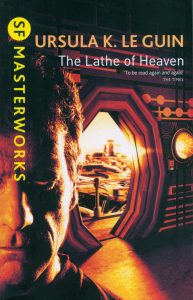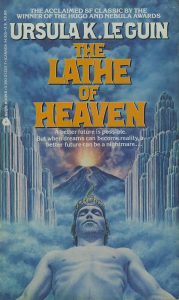The Lathe of Heaven by Ursula K. Le Guin – Book Review
 George Orr is afraid of falling asleep. When he dreams a particular kind of dream, what Le Guin titles an ‘effective’ dream, Orr wakes up to find reality has quite literally shifted to accommodate that dream. When we first meet him, the weight of this has turned him into a drug user, taking anything that will suppress his dreams–it is this that sends him into the private practice of one William Haber, a psychiatrist and oneirologist who will proceed to use Orr’s “effective” dreams to reshape reality in increasingly ambitious ways.
George Orr is afraid of falling asleep. When he dreams a particular kind of dream, what Le Guin titles an ‘effective’ dream, Orr wakes up to find reality has quite literally shifted to accommodate that dream. When we first meet him, the weight of this has turned him into a drug user, taking anything that will suppress his dreams–it is this that sends him into the private practice of one William Haber, a psychiatrist and oneirologist who will proceed to use Orr’s “effective” dreams to reshape reality in increasingly ambitious ways.
Haber finds Orr almost loathsome. George awakens contempt in the psychiatrist; Haber sees in Orr a man so weak and without character as to be bullied. He finds George’s “peculiar state of poise,” (137) not a sign of “self-harmony” but rather “self-cancellation”. Haber has ideas – grand ideas, as we find out, about the way the world should be. Every utopian notion that you might be brave enough to dream of—eliminating war, racial hatred, restoring the ecological balance of the planet and solving overpopulation; tackling poverty and inequality, mental illness, and more. But his tool—Orr himself—is imperfect. He resists, he struggles, he frustrates every one of Haber’s attempts to reorganize reality according to his beliefs; and all of this comes from these two men’s very different conceptions of reality and human beings’ role within it.
Orr reminds me of no one so much as Dostoyevsky’s idiot, especially here: “He never spoke with any bitterness at all, no matter how awful the things he said. Are there really people without resentment, without hate, she wondered. People who never go cross-grained to the universe? Who recognize evil, and resist evil, and yet are utterly unaffected by it?” He has that same child-like innocence, backed up by a moral strength of character.
And Haber is, he is in some ways a very clear crystallization of the values of the Judeo-Christian-Rationalist West. He is an individualist who doesn’t quite believe anything outside of him exists. He catches on pretty quickly that Orr can change reality, though he lies to himself about it, at first. Then he lies to Orr, because “he thinks you can make things come out right” (99) all the meanwhile having no interest in “what is true, in what is; he can’t see anything except his mind – his ideas of what ought to be.”
 Through Haber, this novel asks not only “Can we imagine the future?” but “What is the price for that future?” Six billion lives are but a start – and by the end of Lathe of Heaven, the words spoken in jest by the novel’s third main character, Heather Lelache, echo back to the reader. Haber becomes, in truth, a “Mad Scientist with an Infernal Machine” (47), further and further engaged in a project that sees him mould the world in continuously more utilitarian ways, while also increasing Haber’s own influence and position. This never once seems to strike Haber as wrong, though we recognize it as such—but one of the defining qualities of the psychiatrist is his extreme rationalist, utilitarian view of the world. A view in which morality plays no part. Opposite this is our dreamer, George Orr. Ironically, Orr does not dream of a better world; rather, he believes that man has no right to meddle with the world in the way his dreams allow him to – and here you see the root of disagreement between the two. Where Haber is described as only having layers upon layers and never a center, Orr is characterised thus by Heather: “He was the strongest person she had ever known, because he could not be moved away from the center” (95).
Through Haber, this novel asks not only “Can we imagine the future?” but “What is the price for that future?” Six billion lives are but a start – and by the end of Lathe of Heaven, the words spoken in jest by the novel’s third main character, Heather Lelache, echo back to the reader. Haber becomes, in truth, a “Mad Scientist with an Infernal Machine” (47), further and further engaged in a project that sees him mould the world in continuously more utilitarian ways, while also increasing Haber’s own influence and position. This never once seems to strike Haber as wrong, though we recognize it as such—but one of the defining qualities of the psychiatrist is his extreme rationalist, utilitarian view of the world. A view in which morality plays no part. Opposite this is our dreamer, George Orr. Ironically, Orr does not dream of a better world; rather, he believes that man has no right to meddle with the world in the way his dreams allow him to – and here you see the root of disagreement between the two. Where Haber is described as only having layers upon layers and never a center, Orr is characterised thus by Heather: “He was the strongest person she had ever known, because he could not be moved away from the center” (95).
 And what happens when two opposite forces meet halfway? Collision, with catastrophic consequences.
And what happens when two opposite forces meet halfway? Collision, with catastrophic consequences.
The novel is a philosophical tour de force. The larger part of it takes the form of dialogues between Orr and Haber, occasionally broken through with expository description and the appearance of Heather, the ambitious lawyer whose hunger for life’s mysteries leaps off the page. I’ve not given Heather her due here, but she has an importance to the story I’ll mull over in a future post and/or video later down the line.
A work of social sci-fi if ever there was one. Here, the argument can be made that this work deserves, more than most, the label of science-fantasy. Scholar Carl D. Malmgren, in his paper on the Lathe of Heaven, makes the point that the main conceit of this novel, the dreaming inherently “violates the norms of scientific possibility,” (319) and that changing reality through dreaming in unscientific. Malmgren’s is a brilliant take on the book which digs a fair bit deeper into the characters of Orr and Haber than this post does.
The Lathe of Heaven is a special work, powerful and relevant, a love letter to Philip K. Dick’s questing, paranoid works of the sixties, and unique among Le Guin’s opus. It’s among the darkest, most uncertain of her novels, and well-worth its place among the masterworks of SF. Give it the time of the day, you won’t regret it.
